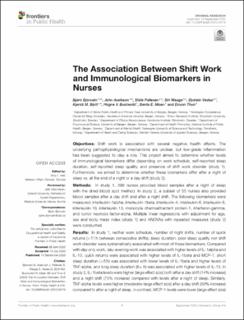The association between shift work and immunological biomarkers in nurses
Bjorvatn, Bjørn; Axelsson, John; Pallesen, Ståle; Waage, Siri; Vedaa, Øystein; Blytt, Kjersti Marie; Buchvold, Hogne Vikanes; Moen, Bente Elisabeth; Thun, Eirunn
Journal article, Peer reviewed
Published version
Permanent lenke
https://hdl.handle.net/11250/2686191Utgivelsesdato
2020Metadata
Vis full innførselSamlinger
- Institutt for psykisk helse [1308]
- Publikasjoner fra CRIStin - NTNU [38542]
Sammendrag
Objectives: Shift work is associated with several negative health effects. The underlying pathophysiological mechanisms are unclear, but low-grade inflammation has been suggested to play a role. This project aimed to determine whether levels of immunological biomarkers differ depending on work schedule, self-reported sleep duration, self-reported sleep quality, and presence of shift work disorder (study 1). Furthermore, we aimed to determine whether these biomarkers differ after a night of sleep vs. at the end of a night or a day shift (study 2).
Methods: In study 1, 390 nurses provided blood samples after a night of sleep with the dried blood spot method. In study 2, a subset of 55 nurses also provided blood samples after a day shift and after a night shift. The following biomarkers were measured: interleukin-1alpha, interleukin-1beta, interleukin-4, interleukin-6, interleukin-8, interleukin-10, interleukin-13, monocyte chemoattractant protein-1, interferon-gamma, and tumor necrosis factor-alpha. Multiple linear regressions with adjustment for age, sex and body mass index (study 1) and ANOVAs with repeated measures (study 2) were conducted.
Results: In study 1, neither work schedule, number of night shifts, number of quick returns (<11 h between consecutive shifts), sleep duration, poor sleep quality, nor shift work disorder were systematically associated with most of these biomarkers. Compared with day only work, day-evening work was associated with higher levels of IL-1alpha and IL-13, quick returns were associated with higher levels of IL-1beta and MCP-1, short sleep duration (<6 h) was associated with lower levels of IL-1beta and higher levels of TNF-alpha, and long sleep duration (8+ h) was associated with higher levels of IL-13. In study 2, IL-1beta levels were higher (large effect size) both after a day shift (14% increase) and a night shift (75% increase) compared with levels after a night of sleep. Similarly, TNF-alpha levels were higher (moderate-large effect size) after a day shift (50% increase) compared to after a night of sleep. In contrast, MCP-1 levels were lower (large effect size) both after a day shift (22% decrease) and a night shift (12% decrease) compared with after a night of sleep.
Conclusions: We found some indications that shift work influenced immunological biomarkers. The results should be interpreted with caution due to limitations, e.g., related to the sampling procedure and to low levels of biomarkers in the blood samples.
